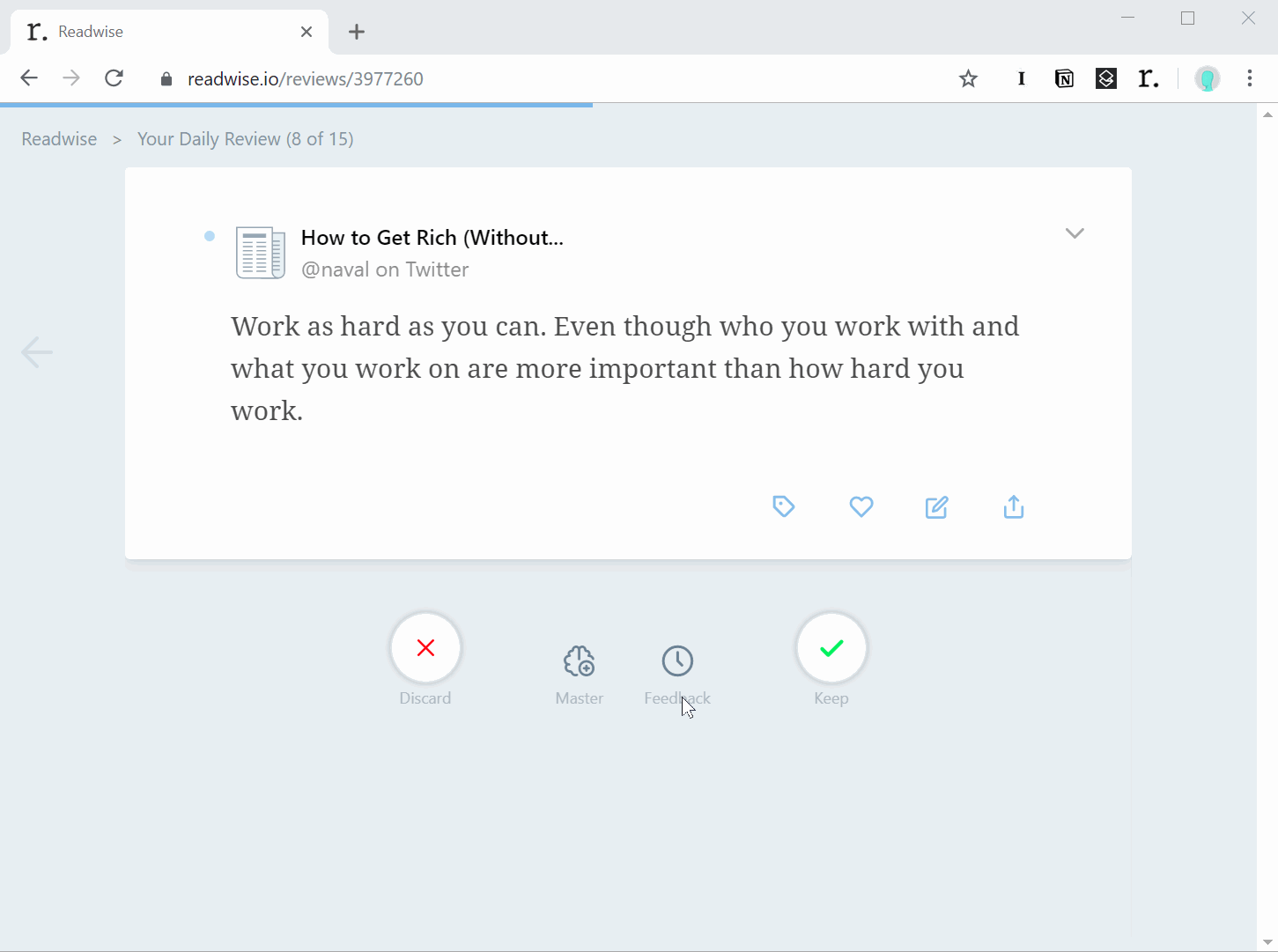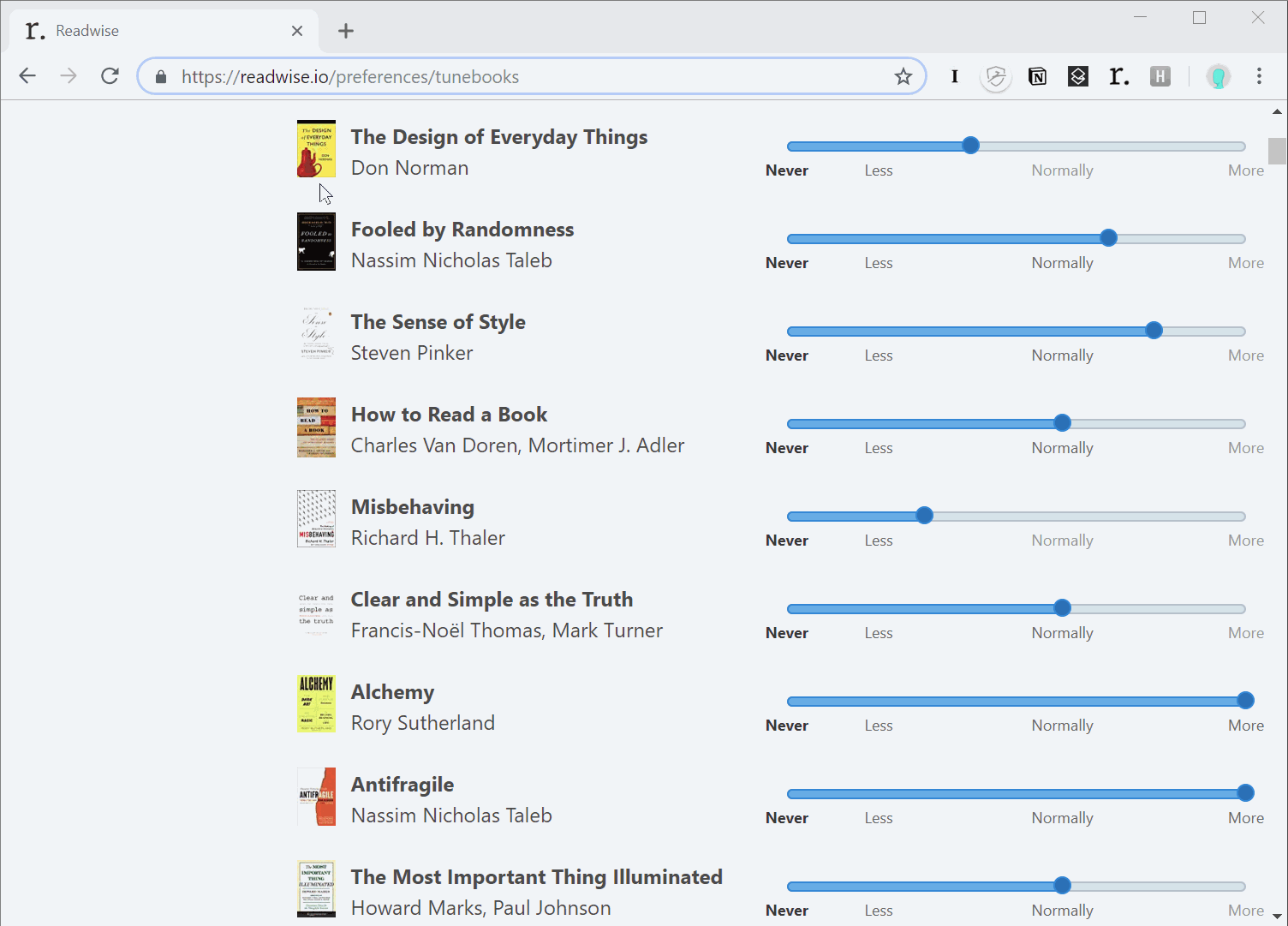Andyʼs working notes
About these notesReadwise
Readwise is a service which tries to help you remain engaged with interesting ideas you’ve read. It extracts highlights from Kindle, “read later” services, physical books via photos + OCR, etc. Then it sends you a daily email with a random assortment of those highlights so that they’re periodically refreshed in your mind.
Founded by Tristan Homsi and Daniel Doyon.
SRS-like functionality
They’ve gradually introduced some features of a Spaced repetition memory system. In the course of reading through your daily highlights, you can smoothly “upgrade” the interesting ones into cloze deletions or even custom question/answer prompts. This is a clever strategy for onboarding people new to spaced repetition: the product delivers (slight) value if you’re totally passive, but as users become invested, they can apply incremental effort over time and get more out of the product.

Note that the core feedback actions in Readwise are knobs tuning when to show the highlight again (sooner, later, eventually). You don’t mark yourself as having remembered correctly or incorrectly.
If the goal were to produce good SRS recall prompts, I’d worry that this wouldn’t work well: Cloze deletion prompts seem to produce less understanding than question/answer pairs in spaced repetition memory systems, and people mostly won’t write good Q/A prompts because Writing good spaced repetition memory prompts is hard. This interface also encodes a 1:1 relationship between passages and prompts, which is not good for thoroughly learning material: Spaced repetition memory prompts should encode ideas from multiple angles.
But the goal isn’t to produce detailed memory: it’s closer to the aspiration described in Timeful text, focusing on the effect I describe in The mnemonic medium keeps readers in contact with material over time. “…the point is to reprogram your brain. To prime your mind to spot patterns, form connections, and resurface the right idea at the right time.” Does this approach actually do that? Hard to know! The evidence for this isn’t clearly available like it is for memory, but that’s part of the fun. Because it’s hard to quantify this kind of outcome, this actually makes a business a better place to test the idea: if people continue paying for the service, they clearly find it valuable.
This detailed UI for managing the intervals of specific books is a thoughtful touch. I wonder how many users edit these. Rather than setting a value explicitly, I wonder if it would make more sense to tune these incrementally over time through “see less” / “see more” type interactions during reviews (which they have as well?):
Note management
Readwise also offers note organization features: you can tag and add notes on your highlights.
In general, I fear that the choice to organize everything around books falls afoul of Do your own thinking and Collecting material feels more useful than it usually is. You’re reading these highlights, and you can make a note about an individual highlight, but the product makes it difficult to draw those insights together into something larger. For that, the workflow is to export your highlights to some other environment (Notion, Evernote, etc). But there’s no connection (as far as I can see) between the review workflow and that environment.
Organization
Readwise was created by {Daniel Doyon} and {Tristan Homsi}. It’s a bootstrapped business.
Perhaps because it’s a business, it’s often misleadingly confident in its claims, contra Pitching out corrupts within:
We don’t remember things by just reading them once. Readwise fixes this using a scientific process called Spaced Repetition.
For example, if you apply Mastery to Deep Work and your weekly calendar starts to fill with shallow calls and meetings, your mind will likely notice the pattern and then start nudging you to create some uninterrupted space.
…
The sky is the limit.
…
But until Elon Musk finishes his Neuralink , the combination of books, Readwise, and Mastery is one of the most effective techniques we've got.
References
Collecting material feels more useful than it usually is
Accumulating tabs, saving PDFs, and making bookmarks feels like progress, but we systematically overrate its value. Understanding requires effortful engagement; you are not likely to draw much understanding from a folder of barely-skimmed PDFs.
We collect material because it’s easy, and because it quells the anxiety that we’ll never find what we’re looking at again. But really, we’re often just making things worse, burying important materials in tons of secondary matter we just “don’t want to lose.” This notion is in contrast to Knowledge work should accrete.
This is a first step to conquer Collector’s Fallacy: to realize that having a text at hand does nothing to increase our knowledge.
Instead, we should Write about what you read to internalize texts deeply, because Evergreen note-writing helps reading efforts accumulate. And to help steer ourselves effectively (contra Note-writing practices provide weak feedback), we should process collected materials in short iteration cycles, rather than letting them pile up for long periods. But! Keep in mind that Most texts aren’t worth writing detailed notes about.
Often a good compromise is to use spaced repetition to cheaply internalize a few key details; you can come back and write real notes later if the material turns out to be valuable. See e.g. Deciding to remember something with a spaced repetition system is (aspirationally) a lightweight gesture
References
The Collector’s Fallacy • Zettelkasten Method
Because ‘to know about something’ isn’t the same as ‘knowing something’. Just knowing about a thing is less than superficial since knowing about is merely to be certain of its existence, nothing more. Ultimately, this fake-knowledge is hindering us on our road to true excellence. Until we merge the contents, the information, ideas, and thoughts of other people into our own knowledge, we haven’t really learned a thing. We don’t change ourselves if we don’t learn, so merely filing things away doesn’t lead us anywhere.
Just like photocopying is self-rewarding and addictive, I argue that we fall into the same trap of false comfort when we bookmark web pages and sort the bookmarks into folders or tagged categories. Bookmarking a web page is satisfying because we get rid of the fear of losing access to the information. I get into detail in another post .
This is a first step to conquer Collector’s Fallacy: to realize that having a text at hand does nothing to increase our knowledge. We have to work with it instead. Reading alone won’t suffice: we have to create notes, too, to create real, sustainable knowledge.
Especially when we start to research something new, Eco recommends we read and highlight texts right after we create copies. If we train ourselves to process photocopied texts soon, we get a feeling of how much we can really handle.
Shorter cycles of research, reading, and knowledge assimilation are better than long ones. With every full cycle from research to knowledge assimilation, we learn more about the topic. When we know more, our decisions are more informed, thus our research gets more efficient. If, on the other hand, we take home a big pile of material to read and process, some of it will turn out be useless once we finished parts of the pile.
The marks which can make a difference to their organisations are on the knowledge workers not on the pieces of paper. This is what it means to inform - to change the form of a person or a device such that they act differently (ideally more effectively) on their environment.